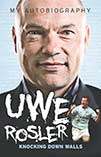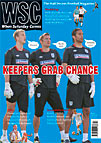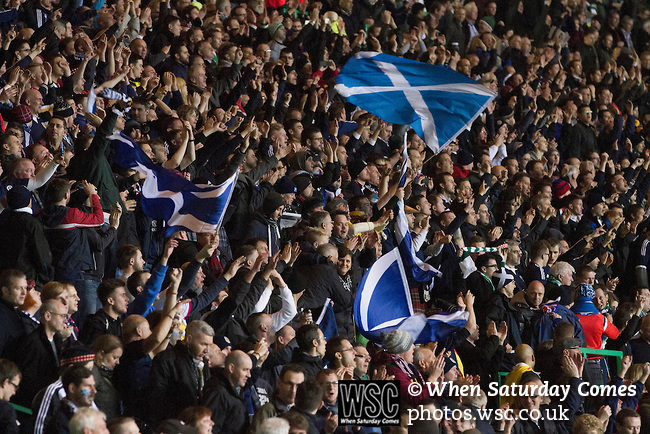Search: 'Leipzig'
Stories
For the first time the second tier will have more title winners than the top division
5 August ~ For the first time ever, Bundesliga 2 hosts a higher number of former national champions than the top division. Tonight, Kaiserslautern and Hannover 96 contest the inaugural match of the new season. A pairing like that wouldn’t look out of the place in the Bundesliga given that those two sides share no less than six national championships between them. Indeed, preceding the set-up of the Bundesliga, Kaiserslautern and Hannover met in the 1954 national final, the rank outsiders from the north thumping their more illustrious opponents 5-1.
 My autobiography
My autobiography
by Uwe Rösler & David Clayton
Trinity Mirror, £16.99
Reviewed by John Van Laer
From WSC 327 May 2014
Uwe Rösler is one of the best-known German footballers to have played in England but is widely regarded in his homeland as nothing more than a journeyman striker. Somewhat injury-prone and sporadically effective at various clubs in Germany before and after the fall of the Berlin Wall, Rösler’s cult status among Manchester City fans remains a mystery to those whose only memory of him is for playing in East Germany’s last-ever international fixture in 1990.
His autobiography is yet to appear in German (although each chapter has a title in his native language) but is certainly not just aimed at diehard City fans. As the title suggests, much of Knocking Down Walls deals with his childhood in East Germany and the opportunities afforded by the collapse of the communist system after 1989. He seems keenly aware of the important role in his personal development played by his years in the East German sporting system. Remarkably, neither of his parents were Communist Party members but that didn’t prevent the young Rösler from being offered a prized place in the academy system at Lokomotive Leipzig, one of the biggest names in East German football. Rigid discipline and pressure to succeed became part of daily life for all trainees, in a world where seniority was defined by the canteen tokens their performance merited rather than financial rewards.
However, Rösler’s temper and unwillingness to accept gradual progression to the first team in Leipzig resulted in his first managerial bust-up and a subsequent transfer to a lower-division team. Such impulsive behaviour became something of a feature of his career, colouring his image in Germany and flaring up most publicly in his outburst at then City manager Alan Ball, who had dropped Rösler from the starting XI for a Manchester derby.
His time in England certainly never featured anything as intimidating as being interviewed by the Stasi (East Germany’s secret police), who threatened to end his footballing career if he refused to become an informant. After this experience, Rösler rarely seems to have been fazed by any negative developments, not even the aggressive tumour in his chest that ended his playing career in Norway and left him with just a five per cent chance of survival.
Since recovering from cancer, his managerial career has described a gradual ascent – first at three clubs in the Norwegian top flight before being given the chance to return to English football at Brentford, a club for which Rösler seemed to have developed a real, and reciprocated, affection. One of the quirks of footballers’ autobiographies is that they often end on phrases such as “hopefully, we can really make things happen over the next few seasons” only for the author to move on shortly after publication. This book is no exception but Rösler’s departure was not acrimonious and his genial personality and professionalism won him many friends during his tenure at Griffin Park.
Indeed, the majority of chapters about his time playing and managing in England and Norway are written with great affection for his adopted homes. While much of his early career was very different to anything experienced by young professionals in England, there are sections of the book that follow a pattern common to many footballing autobiographies: anecdotes about favourite team-mates and unpopular managers, big matches and training ground incidents. However, the historical context and Rösler’s willingness to embrace challenges give Knocking Down Walls something a little different, and it will be interesting to see where his ambition and attitude can take him.
 Paul Joyce studies how the Berlin Wall divided the city arbitrarily and changed the lives of clubs, players and fans
Paul Joyce studies how the Berlin Wall divided the city arbitrarily and changed the lives of clubs, players and fans
Although post-war Germany was divided into two states in 1949, football clubs on both sides of the border were determined to maintain sporting relations. Despite political tensions between capitalist West Germany (FRG) and the socialist East (GDR), numerous cross-border friendlies took place on public holidays in the early 1950s. These proved massively popular with supporters on both sides of the divide. In October 1956, 110,000 East German fans filled the new Leipzig Zentralstadion to watch 1.FC Kaiserslautern, whose team contained five players from West Germany’s 1954 World Cup-winning side, beat SC Wismut Karl-Marx-Stadt 5-3.
 Three years ago, Jens Heilmann began a project to photograph the footballs used in every World Cup final. From the introduction to a new book, The World Cup Balls, Norbert Thomma describes how they were painstakingly tracked down
Three years ago, Jens Heilmann began a project to photograph the footballs used in every World Cup final. From the introduction to a new book, The World Cup Balls, Norbert Thomma describes how they were painstakingly tracked down
Internet searches on World Cup footballs showed only that they had been badly photographed. There was scant information about the originals. Apparently the world was only interested in goals and artistic overhead kicks, in saved penalties and vicious fouls, in posing winners and fallen idols. But the single item they all fight over was often ignored.
